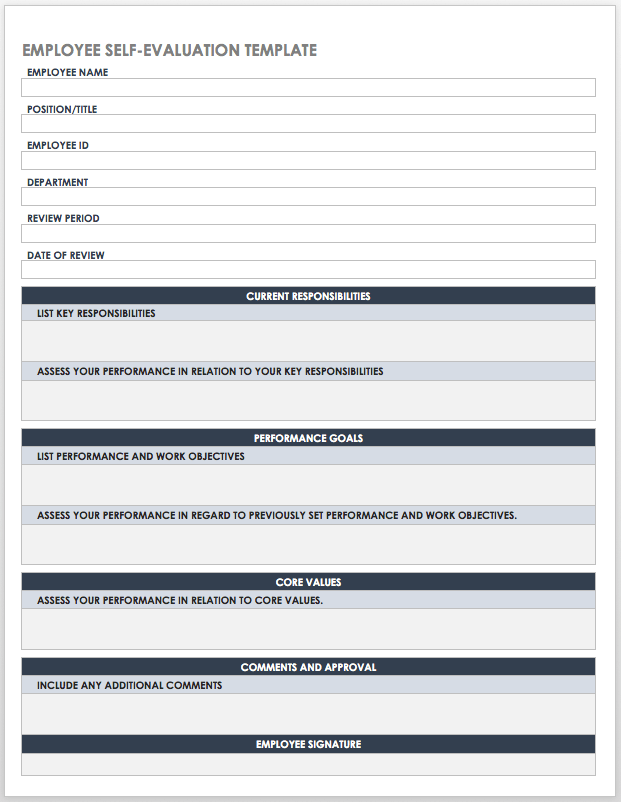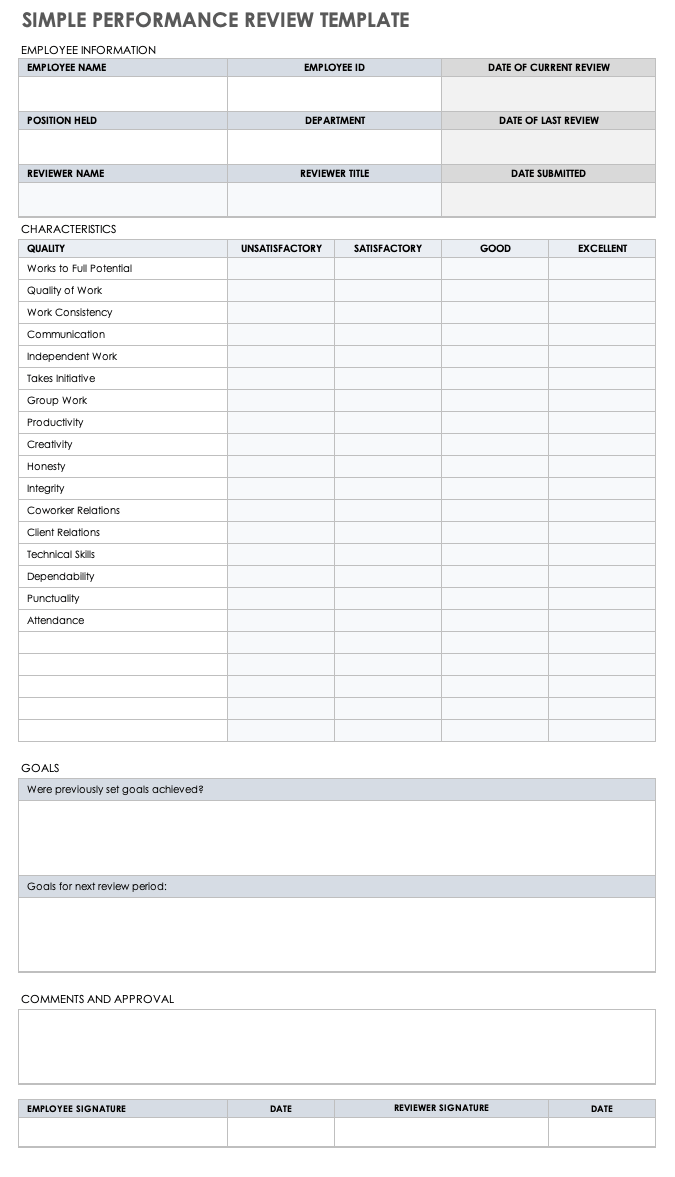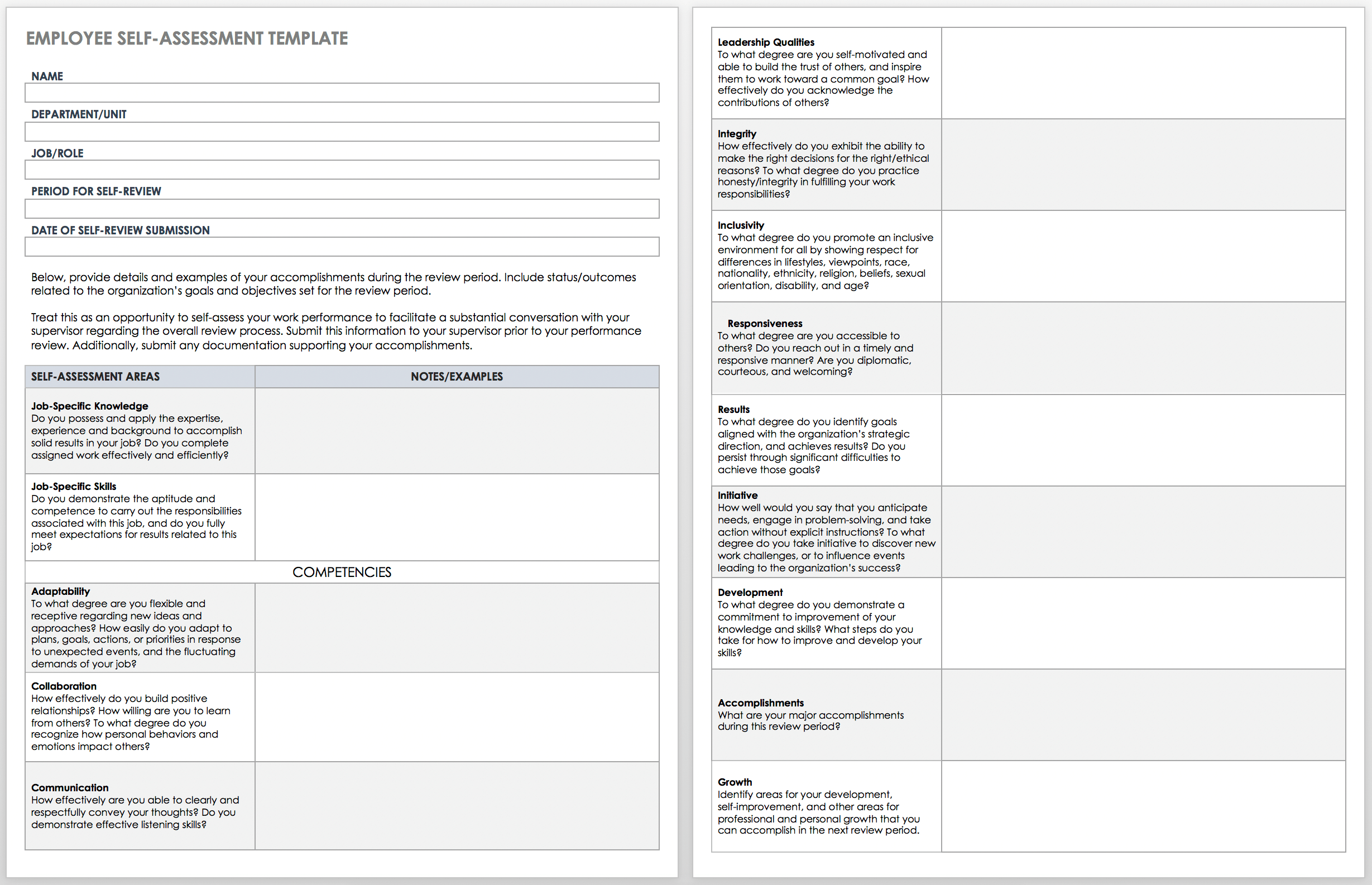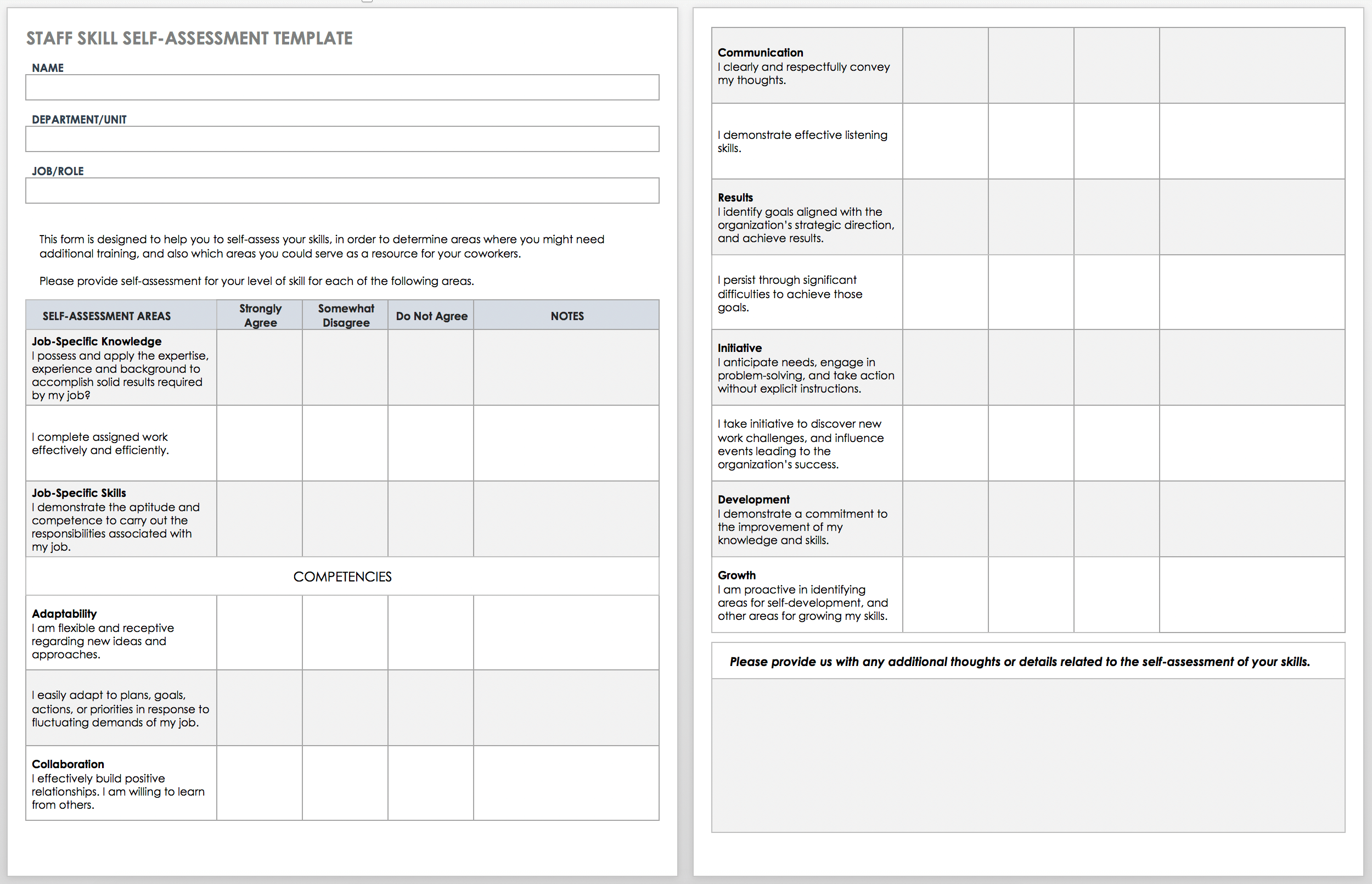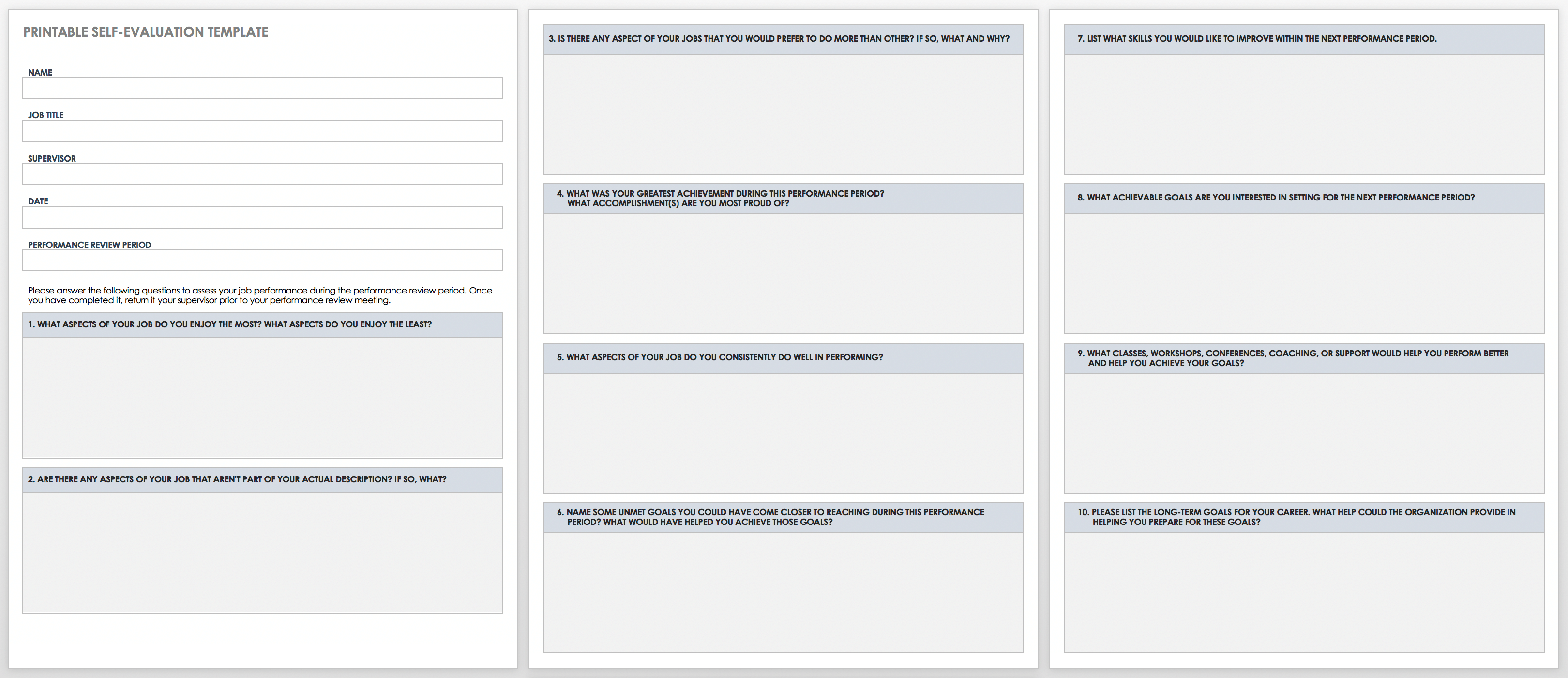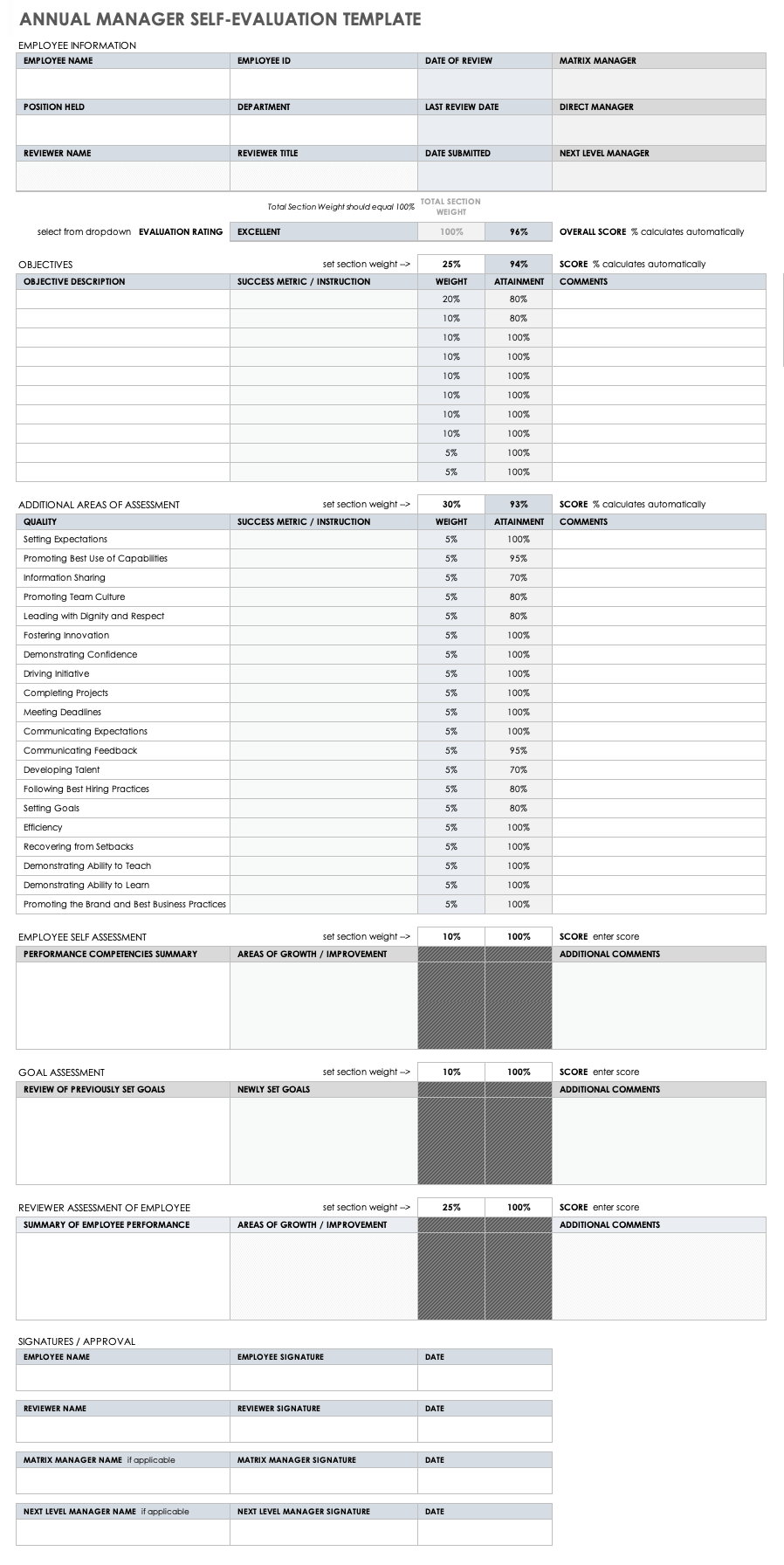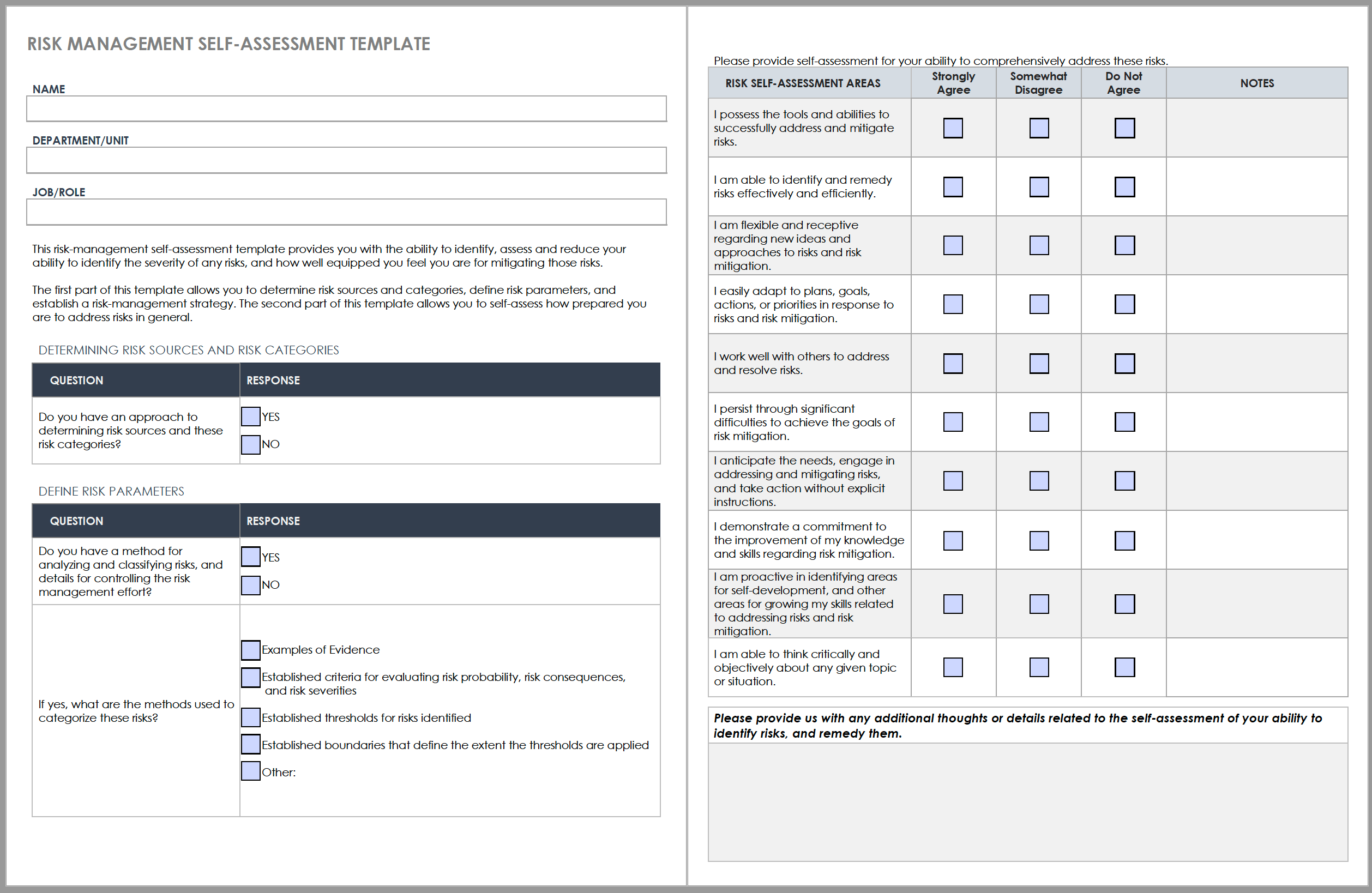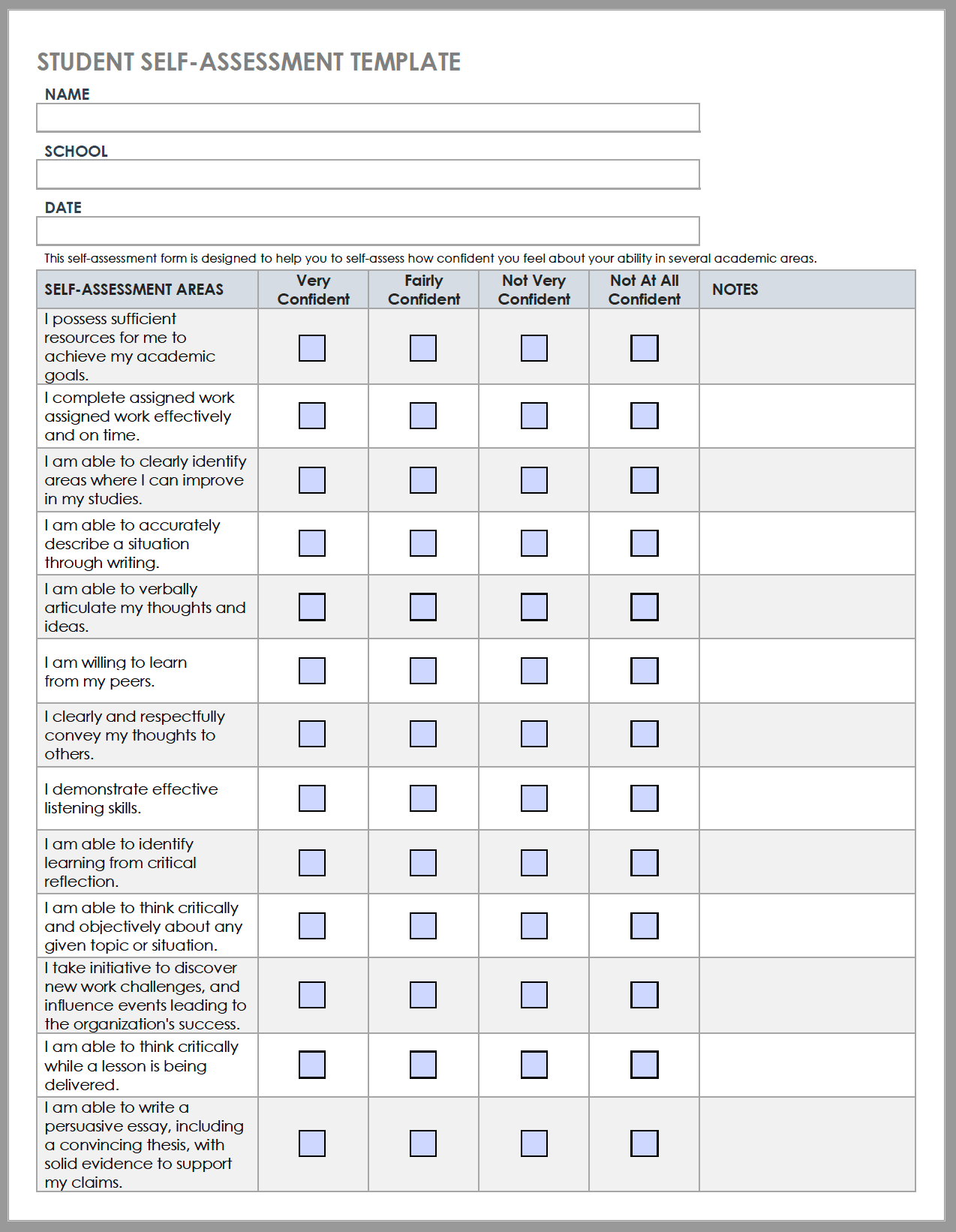Employee Self-Evaluation Template
Download Employee Self-Evaluation Template
Excel | Word | Smartsheet
This employee self-evaluation template is the perfect vehicle for you to match your accomplishments with the key responsibilities and performance objectives of your job. The template provides generous space for you to record your current responsibilities, goals, and overall performance, and then compare them to your company’s goals. Documenting yourself in this way demonstrates to management that you’ve proactively aligned yourself with your organization’s overall strategy for success.
For more on self-assessment and performance reviews, see “How to Write and Survive Your Self-Assessment and Performance Review.”
Simple Performance Review Template
Download Simple Performance Review Template
Excel | PDF | Smartsheet
Use this simple performance review template to evaluate your own performance. This easy-to-use self-evaluation template includes a characteristics section that allows you to rank yourself (from unsatisfactory to excellent) regarding your work-quality attributes, and also provides a goals section to document what you’ve achieved in the evaluative period. Moreover, it has space for you to enter goals to meet by the next review period.
For more on effective performance reviews, see “The Secrets to an Effective Performance Review: Examples, Samples, and Forms.”
Employee Self-Assessment Template
Download Employee Self-Assessment Template
Enumerate and evaluate your job-specific achievements with this unique employee self-assessment template. The template enables you to show your boss how seriously you take your self-evaluation and your job. This template includes fields to list your name, department, job/role, period, and date, and also provides ample space to list your achievements (including how knowledgeable and skillful you are in your particular position, as well as how adaptable and collaborative you are in general). Once you complete this form, your boss will be able to refer to it as a quick reminder of your accomplishments.
For more on writing an effective performance review, see “How to Write an Effective Performance Review as Quickly as Possible.”
Staff Skill Self-Assessment Template
Download Staff Skill Self-Assessment Template
Designed with skill assessment in mind, this template gives you the ability to evaluate your own skills. Perform this self-assessment so your employer can determine your preferred learning style and, therefore, take the best approach to help you improve your skills and further develop your skill set.
Printable Self-Evaluation Template
Download Printable Self-Evaluation Template
Use this print-friendly self-evaluation template to identify the strengths of your job performance and determine where you have room for improvement. This template also gives you space to articulate what you like most about your job, as well as what skills you’d like to improve upon. Complete with a section in which you can rank aspects of your overall performance, this self-evaluation template has everything you need to write a comprehensive and effective self-review.
Annual Manager Self-Evaluation Template
Download Annual Manager Self-Evaluation Template — Excel
This manager-specific self-evaluation template is perfect for managers who want to provide a detailed account of their own annual performance. The template form automatically tallies percentage worth and percentage awarded columns, so managers can instantly see how they measure up to company priorities and expectations. This template also gives managers space to fill in self-assessment and goal-assessment details, and is completely customizable to fit the needs of your particular role.
To make sure you’re including everything in your performance review, see “Cheat Sheet Checklist: Performance Review Preparation for Managers.”
Risk-Management Self-Assessment Template
Download Risk-Management Self-Assessment Template
Designed with mitigation in mind, this risk-management self-assessment template allows you to identify, assess, and reduce the severity of any risks. In the first section of this template, determine risk sources and categories, define risk parameters, and establish a risk-management strategy. The second part of the template prompts you to identify and document individual risks; evaluate, classify, and prioritize those risks; and develop a risk-mitigation plan. Ultimately, using this template will help you to proactively identify and minimize potential risks.
For more on risk management, see “How to Choose the Right Risk-Management Software.”
Student Self-Assessment Template
Download Student Self-Assessment Template
Use this simple, student-specific self-assessment template to document your level of confidence regarding your academic abilities. With a column to rate yourself (from very confident to not at all confident) concerning your overall academic performance, this template will give you clarity about your academic progress by helping you to identify areas of progress, opportunities for development, and much more.
The Importance of Self-Evaluations
Successful organizations depend on the valuable self-assessment input of their employees. Self-evaluations allow employees to reflect, evaluate their own strengths, and assess their own level of achievement. Furthermore, employee self-analysis allows individuals to communicate the goals they feel they’ve met and determine those for which they require additional training or support.
Self-evaluations also serve as an essential tool for employees themselves; in other words, you can use this document to influence your supervisor’s (e.g., manager’s, HR person’s, etc.) evaluation of you. Performing a self-evaluation is a proactive way to articulate what you’ve accomplished, pinpoint the areas in which you might need to improve, and determine the steps you’ll take to do just that.
But, most importantly, a self-evaluation reflects your ability to communicate just how well you’ve performed. What you’re really demonstrating with your self-evaluation is that you understand what your position requires and that you deserve to be rewarded for your achievements. In short, use a self-evaluation template to document your ongoing commitment to improving your performance within the organization.
Companies allow you to self-assess before they formally evaluate you — by writing your self-evaluation, therefore, you have the opportunity to enumerate your successes and demonstrate that you recognize your job requirements. When you write your self-evaluation effectively, it assures your organization that you’ll continue to succeed in your role.
Whether you’re an employee completing a self-evaluation for an annual review or a risk management exercise, or a student performing a self-assessment to indicate your preferred learning style, self-evaluations provide you with the opportunity to reflect on your achievements, progress, and goal setting. An accurate self-evaluation shows that your organization should reward you according to your achievements in the many facets of your job.
How to Write Self-Evaluations: Best Practices
Next to receiving a positive annual review from your employer, nothing is more important to your success and advancement than your self-evaluation. Without articulating your accomplishments, your employer might forget all that you’ve accomplished for your organization over the past year. A self-evaluation template is the perfect opportunity to remind them.
But, what is the best approach to enumerating your own accomplishments? Your organization looks to your self-evaluation to see how closely you’ve aligned yourself with the demands of your job, and to learn how in accordance you are with its core values. While the company’s assessment of your performance will ultimately be the final word, your ability to write clearly — and reflect on your accomplishments — will be what separates you from the rest of the pack.
Regardless of if your review is glowing or illustrates that you need additional training to succeed in your role, a self-evaluation is the perfect vehicle for you to reflect on your accomplishments and identify areas for growth.
Once you have downloaded one of the free self-evaluation templates in this article, fill in the following applicable self-assessment fields:
- Employee Info: Enter your name, employee ID, department, and position details.
- Review Period: Enter the time period that your self-evaluation covers.
- Current Responsibilities: List your position’s current key responsibilities. Additionally, assess your performance in relation to those key responsibilities.
- Performance Goals: Enter details about whether or not you have achieved the goals that you set in your previous review. Additionally, specify any goals that you want to achieve by the next review period.
- Core Values: Enter details about how your performance compares to your company’s core values.
- Quality: Rank yourself (e.g., unsatisfactory, satisfactory, good, excellent) regarding working to your full potential, delivering quality work, communicating, and taking initiative.
- Job-Specific Knowledge: Describe to what degree you possess — and have applied — the knowledge and expertise to accomplish the goals of your position.
- Job-Specific Skills: Describe how you have demonstrated the aptitude and competencies you need to succeed at your job.
- Competencies: Describe how adaptable you are to new procedures and policies and how collaborative you are with coworkers as well as third parties.
- Comments or Notes: Summarize your self-evaluation with any related, overarching comments.
Improve Employee Self-Evaluation and Self-Assessment with Smartsheet for Human Resources
Empower your people to go above and beyond with a flexible platform designed to match the needs of your team — and adapt as those needs change.
The Smartsheet platform makes it easy to plan, capture, manage, and report on work from anywhere, helping your team be more effective and get more done. Report on key metrics and get real-time visibility into work as it happens with roll-up reports, dashboards, and automated workflows built to keep your team connected and informed.
When teams have clarity into the work getting done, there’s no telling how much more they can accomplish in the same amount of time. Try Smartsheet for free, today.
